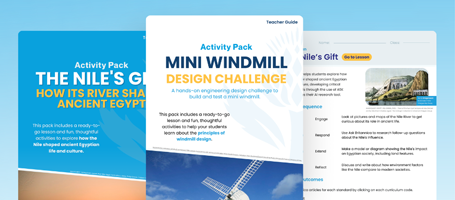Teachers have faced some pretty big odds these last few years.
In 2020, as the world grappled with a global pandemic, entire nations were forced to pivot to online classrooms overnight. It was estimated that within months, our responses to COVID19 may have accelerated the adoption of digital technologies by three to seven years (McKinsey, 2020). The circumstances were unprecedented in our lifetime.
Two years on, accustomed to virtual classrooms and gradually easing back to school, we asked teachers from different Asia Pacific regions about their experiences with remote learning.
What have you liked most about teaching online?
For you, what was/is the biggest challenge about remote learning/teaching?
What are you looking forward to when schools return to face-to-face teaching/learning?
What strategy, lesson or resource did you successfully implement during remote learning?
What have you liked most about teaching online?
Back to Top
Despite the challenges of remote learning, some educators found inspiration in the novelty and flexibility provided by an online learning environment, using it to experiment with new pedagogy. Others appreciated a little extra time with family.
There is some flexibility and I can explore different kinds of pedagogy.
[I like that] I don’t have a 2 hour daily commute. I get to spend more time with my young family. I’m finding the kids who might normally be distracted by peers are excelling at home learning.
Nothing, to be honest. It was really awful trying to engage with pupils in a primary setting via video. Mostly we filmed and shared that way, with no real interaction. Our teachers had some interaction but nothing beats in-person learning.
As a librarian, I like that I can direct students to use our online resources more regularly. I also like that I can record my Zoom lessons and have them available for students who would like to watch again.
I like the flexibility in my schedule that allows me to spend time with my family and on personal interests. But specifically in terms of teaching, I don’t like it much at all. I only like the fact that I can try some new ideas that might then be useful later in the physical classroom. It’s a sort of laboratory for new tech-focused lessons.
I enjoyed the freedom to try different things. When you are in an environment that is new, there are so many opportunities to experiment and explore.
I liked reading the interactions between my students. They were really kind and helpful to one another and gave each other a lot of suggestions – where to go to find information, how to work on the task I set and how to perhaps upload their photos etc.
For you, what was/is the biggest challenge about remote learning/teaching?
Back to Top
While there were different things to like about remote learning, many of the teachers we spoke to agreed that the biggest setback was a lack of human interaction, which came with a heavy psychological toll. Despite everyone’s best efforts, many felt the absence of two-way communication made it difficult for students to engage and for teachers to provide effective, differentiated and timely support. The need to adopt new processes and technologies also added to an existing heavy workload.
Teaching Drama online was horrible. No ensemble work. Some students did not engage or show up.
[The] lack of interaction with learners. Some learners [were] not engaging with the learning.
Juggling looking after my 9 month old and working. Sometimes explanations of concepts are difficult digitally. It’s hard to get all kids to engage in the lesson.
The HUGE amount [of] admin and marking plus loads of parent phone calls due to disengagement.
I missed the personal connection and gathering with students in the library space.
Technology issues and students not having the resources they needed. Students [have been] missing out on social interactions.
Remaining motivated. I am so extroverted that it is often difficult for me to remain happy when isolated from students and colleagues. I often don’t feel as though I am accomplishing much of note.
Engaging students; seeing students’ reactions; communication seems very one way.
What are you looking forward to when schools return to face-to-face teaching/learning?
Back to Top
For educators who had yet to return to face-to-face teaching at the time of the questionnaire, the overwhelming majority said the thing they were looking forward to most was being able to see and interact with students and colleagues in person again.
Seeing the kids f2f!
Socialising with the staff. That’s probably what I miss the most. Being able to bounce ideas off each other. Seeing those students who I know just can’t wait to get back into the classroom.
Seeing the students and doing the hands-on practical activities.
Working with staff and students.
Interacting with students again.
What strategy, lesson or resource did you successfully implement during remote learning?
Back to Top
The rapidly evolving nature of remote learning meant teachers throughout the Asia Pacific had to be super agile and resourceful. Many came up with brilliantly creative ways to engage students through new or existing technology and innovative lessons.
We used ManageBac as a platform for lessons, homework, video links or showing short clips via screen share.
We have focused on our families’ access to Wabisabi Zen which is our platform for sharing lessons and student work being uploaded. No other apps/websites have been introduced until families are comfortable with this to save confusion. Britannica will be one that we add in coming weeks.
I asked students to complete some online grammar games and then they had to write down their mistakes and fill in a Google Form for submission.
Britannica, ClickView and Distance Ed resources have been so valuable to put together PowerPoints / booklets of information for students to work through. Simple pre-made lesson plans are amazing.
Simplified activities, integrated activities that students can do at home; making connections between the work and home. [Students also learned] how to make videos and upload to a private YouTube – still working on this!
Strengthening an online library presence. Directing students to online resources through our Library Libguides.
Students would be assigned reading from Britannica that they could use as optional sources of research (guided research) during different units.
I have used Britannica extensively. I already used it quite a bit for middle school history, but now I use it more than ever. I think it has had positive results for students, especially in making them more patient to look information up online and verify it.
I use a lot of Google HyperDocs / HyperSlides. I like that you can use them to give students choice – that way they are following their own path and passions.
Simple cooking activities: I gave students the recipe and they would make it, cost it online, total the cost, show the coins/notes, change from $50 etc., upload a photo of themselves with their cooking, be a Master Chef judge and give it a score out of 10 and state their reasons why. They loved those tasks. I could also include simple recipes from different cultures within my class.
Comparing two animals: We had worked on South America and Africa. The children used Britannica to compare two animals of their choice. They could choose – one from Africa and one from South America or two from the one continent. This worked really well.
Note taking: We have been working on this for a while. The children could choose an area of their own interest and then check it out through Britannica. They then needed to create a list of 5 key words. 5 simple phrases or points of interest. From that they then needed to write a paragraph about their chosen topic.
Britannica extends our heartfelt thank you to every teacher and librarian who responded to our questions, as well as to the many who were not part of this interview but nevertheless took up the mighty challenge of ensuring that learning never stopped for their students and communities.
Reference:
McKinsey & Company (2002), “How COVID-19 has pushed companies over the technology tipping point—and transformed business forever”, https://www.mckinsey.com/business-functions/strategy-and-corporate-finance/our-insights/how-covid-19-has-pushed-companies-over-the-technology-tipping-point-and-transformed-business-forever, last accessed 19 Oct 2021
More Educator Resources
Sign up with your email for more free resources from Britannica.

